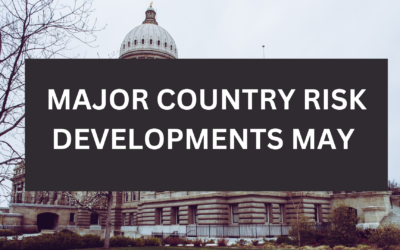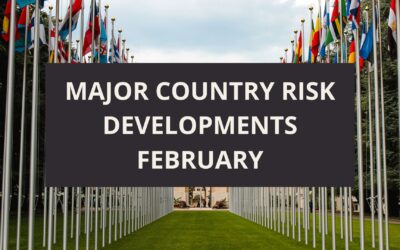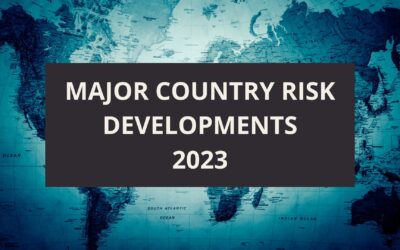Political Risk Insurance
What is Political Risk?
Political Risk, also known as “geopolitical risk,” is the risk of loss of assets, income, or property suffered by corporations, lenders, or investors as a result of political changes or instability in a country. Political risk is present with physical assets located in a host country and when trading with a foreign buyer or a sovereign owned enterprise.
Political risks can drastically impact a company’s investment in a host country. Foreign government intervention or political violence can render a company unable to operate or withdraw their capital from a host country.
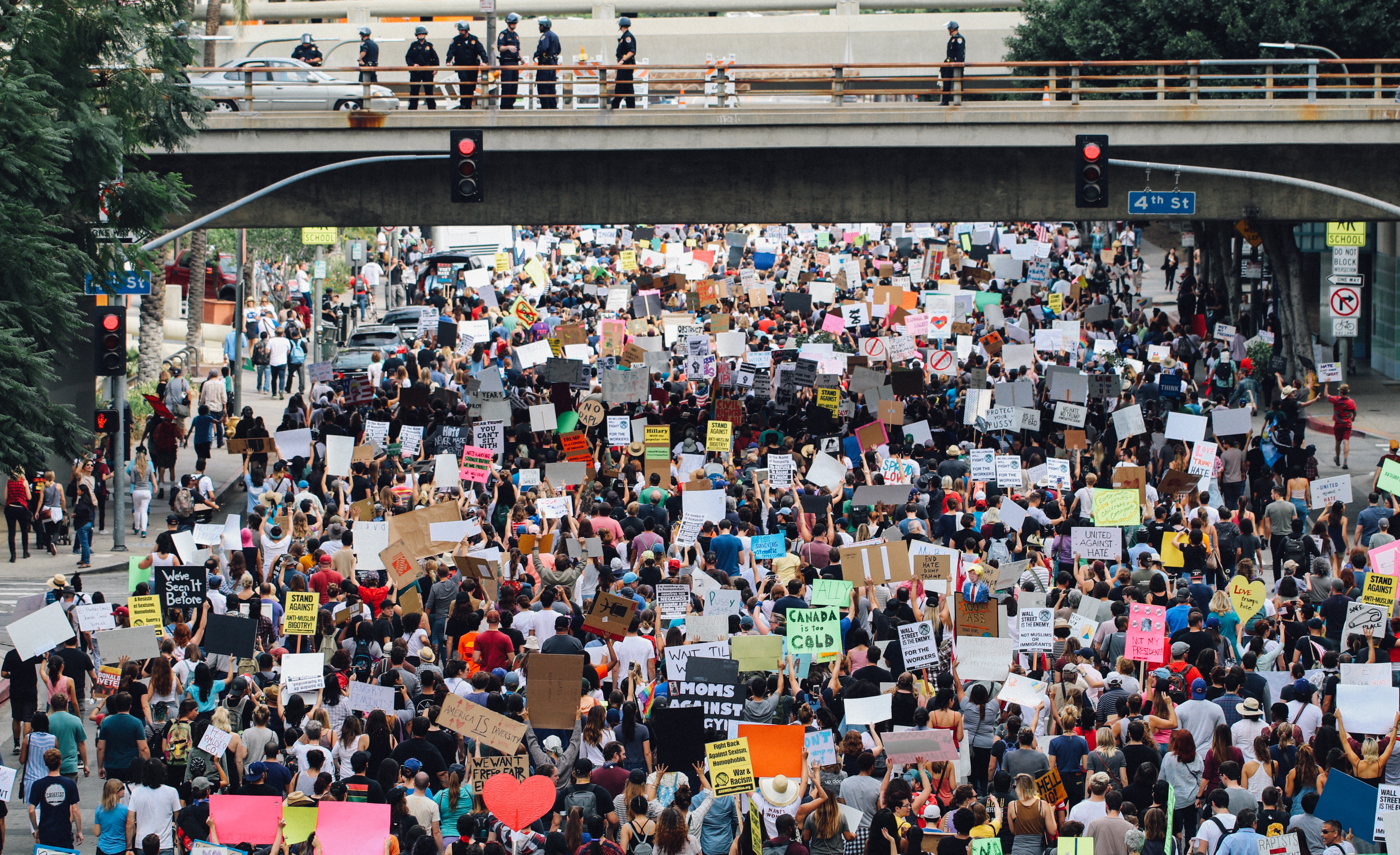
What are the Common Types of Political Risk?
The most common types of political risk are government confiscation, expropriation, nationalization (CEN); currency inconvertibility (CI) and political violence (PV).
1. Government Confiscation, Expropriation or Nationalization (CEN): Foreign government action involving seizure or confiscation of assets, forced divestiture or forced transfer of ownership of assets, or policies (such as regulatory requirements or tax laws) enacted to hinder a firm’s business operations in such a way as to have the effect of expropriation, all fall under this heading. Often done by governments to shore up domestic political popularity, increase government revenue, or exert control over a critical economic sector, expropriation usually contravenes international agreements and causes a firm to lose its ability to operate its overseas investments or assets.
2. Currency Inconvertibility: This includes the imposition of restrictions on conversion of local currency revenues to major currencies (such as US Dollars or Euros), or capital controls, which prevent remission of earnings from an affected country. Currency controls are enacted by foreign governments or their central banks often in response to a rapidly accelerating currency crisis or a sudden change in government or economic policy and have the effect of forcing a firm to limit or end its overseas operations.
3. Political Violence: Civil strife such as rioting, violent protests, terrorism, and war are all forms of politically-motivated violence that can either cause the physical destruction of a firm’s assets or the creation of a situation in which business operations are curtailed or impossible.

How to Protect Against Political Risk
Staying engaged and aware of political events and trends in a country or region is important when doing business internationally. Working with trusted sources of information both domestically and internationally is important to assessing risk and developing strong procedures well before a crisis develops. Professional risk analysts as well as local sources of information such as business partners can be valuable sources of information.
Other suggestions to prepare for political risk include:
1. Understand Your Supply Chain: Supply chains are complex and a firm’s international operations and those of business suppliers can be impacted by political crises in nearby countries or even locations far beyond a specific place of business. Think about possible bottlenecks. Having backup or contingency plans in the case of supply chain disruptions can help mitigate losses or disruptions due to unforeseen events.
2. Know the Decision-Makers: Having partners with a strong economic profile in host country of foreign operations and hiring local employees may reduce your exposure to political risk. A relationship with local bank or an international or regional bank with local operations may help to hedge against political risk. Local banking may facilitate foreign exchange conversions and transfers. Additionally, local banks may be familiar with options to shield some of your assets in the case of a crisis or alert you to political trends in the financial sector that could impact your investment and business operations.
3. Understand Your Credit Risk: An important consideration is that a country’s political and economic difficulties may have implications on credit. Often political crisis can spark a series of events leading to a steep and protracted currency devaluation which leads to buyer payment default. Having a credit risk contingency plan, including a trade credit insurance policy, is another aspect of overall political risk planning to consider.
4. Consider Political Risk Insurance: Political risk insurance is an important part of any risk protection strategy. Protection against risks noted above such as expropriation, violent conflict, political unrest, and currency controls protects your business, investors, and other stakeholders and allows your company to more confidently conduct international business. With a strong political risk policy in place, companies can be more focused on their growth strategies in specific countries and in the short-to-long term, particularly in emerging markets or developing economies.
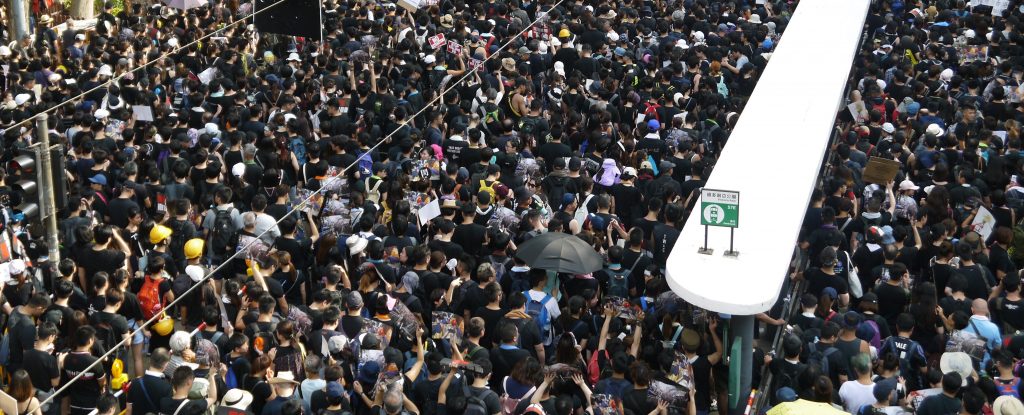
What Does Political Risk Insurance Cover?
There are many political factors that are outside the control for a foreign investor which could cause a loss. A political risk policy typically includes but is not limited to:
1. War and Political Violence or (“PV”)
2. Confiscation, Expropriation and Nationalization or (CEN)
3. Deprivation of Capital
4. Embargo
5. License Cancellations
6. Currency inconvertibility / Non-Transfer
7. Forced Divestiture
8. Contract Frustration / Non-Honoring
9. Unfair and Fair Calling of Bonds
Who Uses Political Risk Insurance?
Corporations, lenders, and investors with physical (fixed/mobile) assets, contracts, investments and international operations in emerging markets. Some typical clients include:
1. Corporations and corporate investors with ownership of overseas financial assets, or international business operations such as joint ventures or subsidiaries that are exposed to financial risk from government policies.
2. Corporations or investors that own overseas physical assets that are exposed to property damage from political violence.
3. Financial Institutions that finance trade transactions, international projects, or other international exposure that is potentially threatened by political risks.
4. Importers and Exporters that have agreements with either private companies, foreign governments, or state-owned enterprises and are exposed to risks to trade flows from political factors.
5. Contractors, developers, and other service providers that do business with foreign governments or state-owned enterprises.
6. Companies in sectors such as mining, engineering, construction, and other services, where both contractual obligations may be threatened by political risks or actual physical assets are at risk of being damaged, expropriated, or become inaccessible due to political factors
How Do I Get Political Risk Insurance?
A political risk insurance broker can assist in developing a policy that meets the specific needs of your business and addresses a country’s political risk in a comprehensive way. A broker can assist in explaining many of the definitions and details of a political risk insurance policy and help you to identify areas of risk you may not have previously considered.
Why Use Securitas Global Risk Solutions?
Since 2004, Securitas Global Risk Solutions (“Securitas”) has helped clients across the United States develop credit and political risk transfer solutions that provides value on several levels. As a specialty independent trade credit and political risk insurance broker, Securitas is focused on developing comprehensive solutions that meet the needs of their clients, ensures complete understanding of policy wording and delivers responsive excellent customer service.
Political Risk News
Major Country Risk Developments May 2023
Posted with permission from greatamericaninsurancegroup.com Overview There appears to be developments on the...
Major Country Risk Developments, February
Posted with permission from greatamericaninsurancegroup.com Overview Federal Reserve has dialed back on the pace of...
Major Country Risk Developments January 2023
Posted with permission from greatamericaninsurancegroup.com Overview The global economy faces several uncertainties in...
900 West Valley Road, Suite 701 | Wayne, PA 19087
Tel. 484-595-0100 Fax. 484-582-0111
P.O. Box 3665, Tyger Valley, Cape Town 7536 South Africa
Tel. 072-308-1112

